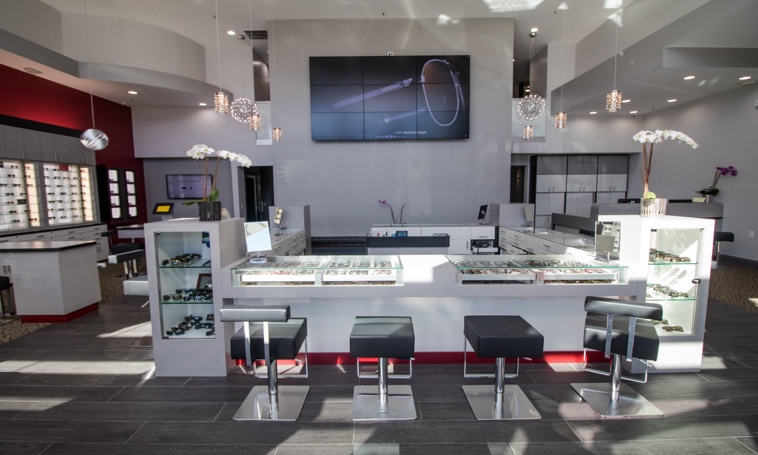EVO ICL vs. LASIK: Which Laser Eye Surgery Is the Right Option for You? [(植入式隱形眼鏡) 与 全飞秒 与半飞秒:哪种激光眼科手术最适合您?]
There are many ways to correct a refractive error, like nearsightedness or farsightedness. Some of the most common corrective methods would be eyeglasses or contact lenses. But what if a person wants a more permanent solution? This is where refractive laser eye surgery can be an option for some people.
LASIK and EVO ICL are 2 eye surgery procedures that can help improve your vision. Neither is better than the other, and each has pros and cons.
Your vision needs, the type of refractive error, and overall eye health and shape all play a part in which option your eye doctor may recommend.
For example, while LASIK can treat a broader range of refractive errors, it may not be an option if someone has thin corneas. Whereas EVO ICL may still be an option because it doesn’t remove any tissue from the eye. You’ll ultimately need a consultation with your eye doctor to determine which option suits your situation.
Why Get Laser Eye Surgery?
Refractive surgery is one of the most common procedures to correct refractive errors like astigmatism, nearsightedness, or farsightedness. Some get results by reshaping or removing part of the cornea; others correct vision with an intraocular lens (IOL).
A benefit of refractive laser eye surgeries is that they are a safe and effective way to achieve permanent vision correction without the need for glasses or contact lenses.
EVO ICL
Implantable collamer lens (ICL) surgery isn’t laser eye surgery in the same way that LASIK is. Instead of the eye surgeon using a laser to remove tissue from the cornea, a small incision is made so they can access the eye’s lens.
Unlike cataract surgery, where the eye’s natural lens is removed, and an artificial IOL replaces it, the natural lens isn’t removed with ICL. Instead, you could think of it more like a permanent contact that sits on the natural lens.
The EVO ICL is a safe and effective way to eliminate the hassle of glasses or contacts. And this particular procedure has a high satisfaction rate of 99.4%.
Benefits of EVO ICL
The benefits of EVO ICL include:
- It can treat a wide range of myopia (nearsightedness) prescriptions, including severe myopia.
- Recovery is generally quick because it’s less invasive than a procedure like LASIK, where tissue is removed from the cornea.
- Unlike other laser eye surgeries, dry eyes aren’t typically a side effect of this procedure.
- EVO ICL does not affect night vision like some laser eye surgery procedures.
- Although most people are looking for a permanent fix, EVO ICL can be reversed by removing the lens if needed.
- Often provides clearer vision outcomes for higher prescriptions
Risks of EVO ICL
It’s considered a safe and effective procedure, but there are still potential risks involved with ICL:
- Infection after the procedure is uncommon, but it can be serious if untreated
- Increased risk of glaucoma and early cataracts
- Need for a second procedure if the lens must be removed
Ultimately, any surgical procedure will have risks. That’s why it’s important to follow your eye doctor’s aftercare instructions and visit them for all follow-up appointments and eye exams so that they can assess you for any signs of complications.
LASIK
LASIK is a common refractive surgery involving reshaping the cornea to correct refractive errors like near and farsightedness or astigmatism. And more than 90% of people who receive LASIK end up with 20/20 vision, which can eliminate the need for further correction from glasses or contacts.
Benefits of LASIK
There are some great benefits to LASIK with its high success rate:
- It’s typically a permanent correction of refractive errors
- Often a quick procedure that only takes around 30 minutes
- 20/40 or 20/20 vision is commonly achieved without glasses following LASIK
- Quick recovery time in most cases
- Can correct multiple refractive errors
Risks of LASIK
Although research shows serious complications of LASIK are rare, it has some potential risks like any other surgery. Temporary side effects may include:
- Light sensitivity
- Glare or halos around lights
- Blurred vision
- Difficulty driving at night
- Dry eye symptoms
Partnering with your eye doctor when considering LASIK and following the procedure is important. They can walk you through the risks and benefits of the procedure and help you know what to do for aftercare.
Other Laser Eye Surgery Options: SMILE & PRK
SMILE
SMILE (small incision lenticule extraction) is a laser vision correction procedure that uses a precise, computer-guided femtosecond laser to reshape the cornea, the eye’s front surface responsible for light direction.
This innovative technique is designed to address myopia (nearsightedness), an eye condition where the eyeball is elongated or the cornea is steeply curved which leads to inaccurate light focus. Light focuses in front of the retina, resulting in blurred distance vision.
Through the cornea reshaping process, SMILE enhances the way light is focused, ultimately improving the eye’s ability to achieve clearer vision.
PRK
PRK laser eye surgery, short for Photorefractive Keratotomy, is a type of refractive surgical procedure designed to correct vision problems such as myopia (nearsightedness), hyperopia (farsightedness), and astigmatism.
During the PRK surgery, an ophthalmologist uses a specialized excimer laser to precisely reshape the cornea, which is the transparent front surface of the eye. By altering the cornea’s curvature, the procedure aims to improve how light is focused onto the retina, ultimately leading to clearer vision without the need for glasses or contact lenses.
PRK is particularly beneficial for individuals with thin corneas or other conditions that may make them less suitable candidates for LASIK. The surgery has a proven track record of success (90% of patients achieving 20/40 vision or better), helping a significant number of patients achieve improved visual acuity and enhance their overall quality of life.
Which Laser Eye Surgery Is Right for You?
One refractive surgery is necessarily better than another. Although, each has some unique benefits.
Ultimately, your eye doctor can review your options to help you make an informed decision.
Our experienced team at Golden Vision Optometry partners with eye surgeons all over California for the co-management of several laser eye surgeries. Give us a call today if you’re interested in learning more about possibly ditching glasses or contact lenses.












